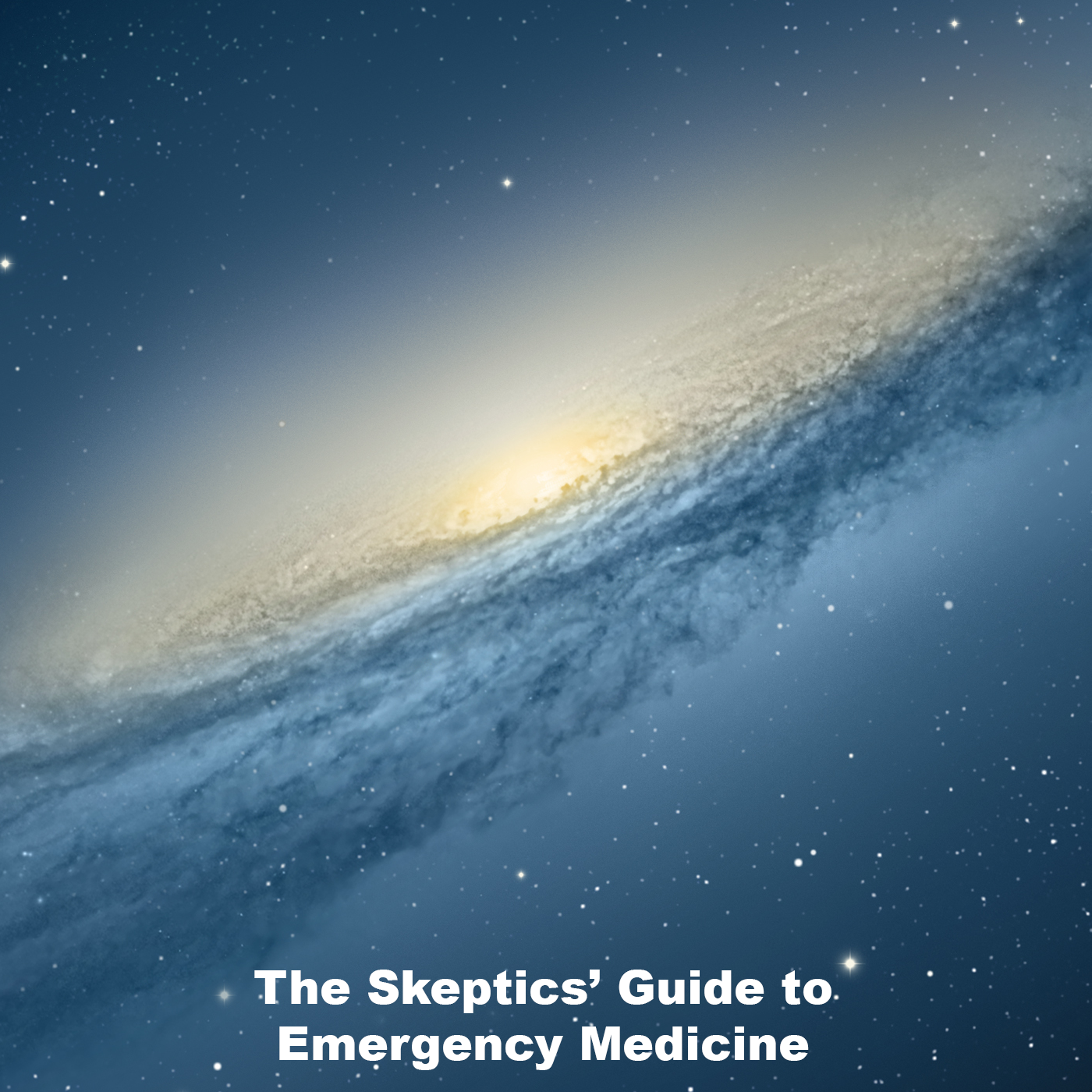

The Skeptics Guide to Emergency Medicine
Dr. Ken Milne
Meet ’em, greet ’em, treat ’em and street ’em
Episodes
Mentioned books

Dec 21, 2024 • 21min
SGEM Xtra: The 12 Days of Christmas the SGEM Gave to Me
Dr. Chris Carpenter, Vice Chair of Emergency Medicine at Mayo Clinic, shares his expertise in statistics with a festive twist. The discussion hilariously explores the 12 Nerdy Days of Christmas, highlighting common statistical faux pas. From the misunderstood P value to the importance of confidence intervals, Carpenter explains how to safeguard clinical decisions. With a playful debate on holiday movie traditions and whimsical insights into evidence-based medicine, this episode combines holiday cheer with vital statistical empowerment.

Dec 14, 2024 • 41min
SGEM #463: Like the Legend of the Phoenix… Criteria for Sepsis
Prof. Damian Roland, a Pediatric Emergency Medicine expert from the University of Leicester, and Dr. Halden Scott, a sepsis researcher at Children's Hospital Colorado, delve into the complexities of diagnosing pediatric sepsis. They discuss the alarming symptoms presented in a case of a critically ill child and highlight the urgent need for improved diagnostic criteria. The Phoenix Criteria are introduced as a revolutionary tool for identifying sepsis, emphasizing its evidence-based approach and potential to enhance clinical decision-making in emergency settings.

Dec 7, 2024 • 41min
SGEM Xtra: If I Had A Million Dollars
Shirley Ngo, a Digital Product Director at RBC and co-host of the "Make It Shine Money" podcast, brings a fresh perspective on financial health for physicians. She discusses how financial literacy is vital for overall well-being and addresses taboo topics like money conversations, particularly among women. Shirley shares insights from her Executive MBA journey, including the complexities of personal finance in relationships. The talk highlights financial challenges for new and mid-career physicians, emphasizing the importance of budgeting, investing, and early financial planning.

Nov 30, 2024 • 26min
SGEM#462: Spooky Scary Access – IV or IO for OHCA
Missy Carter, a seasoned physician assistant in critical care and a former paramedic, discusses the hot debate of IV versus IO access for out-of-hospital cardiac arrest (OHCA). She delves into a recent clinical trial, questioning the biases in survival metrics and their impact on patient outcomes. The conversation touches on the importance of rapid interventions in emergencies, the reliability of neurological outcome assessments, and the critical role of ongoing research in emergency medicine. It's an insightful exploration that challenges conventional practices.

Nov 23, 2024 • 0sec
SGEM#461: If You’re Appy and You Know It…Do You Need a Clinical Prediction Score?
Weihao Li, an advanced trainee in pediatric emergency medicine, dives into the intricate world of diagnosing appendicitis in children. The discussion covers a case of a young boy with abdominal pain and explores the complexities of symptoms and misdiagnoses. Weihao also reveals the rise of clinical prediction scores and their role in enhancing accurate diagnoses. Insights on clinician intuition, data collection challenges, and innovative methodologies illuminate the diagnostic landscape, all while keeping the tone light and engaging.

Nov 16, 2024 • 32min
SGEM#460: Why Do I Feel Like, Somebody’s Watching Me – CHARTWatch to Predict Clinical Deterioration
Michael Page, Director of AI Commercialization at Unity Health Toronto, brings insights into the intersection of artificial intelligence and healthcare. He discusses the promising CHARTWatch system, designed to predict patient deterioration and enhance safety in emergency departments. The conversation dives into the balance between technology and clinician trust, as well as challenges like alarm fatigue. Page also highlights the impact of effective deployment strategies in maximizing AI benefits while addressing the complexities of interpreting clinical study results.

Nov 9, 2024 • 23min
SGEM#459: Domo Arigato Misuta Roboto – Using AI to Assess the Quality of the Medical Literature
Dr. Laura Walker, an Associate Professor of Emergency Medicine at the Mayo Clinic, dives into the transformative role of AI in assessing medical literature. She reveals how large language models like ChatGPT are reshaping critical appraisal in evidence-based medicine. The conversation explores AI's strengths and limitations, emphasizing the synergy between human judgment and machine intelligence. Additionally, she addresses the implications for diagnostic processes, shedding light on the financial costs and ethical considerations of AI integration in healthcare.

Nov 2, 2024 • 0sec
SGEM#458: Hurt So Good –Ketamine Can Make the Hurt so Good – If used as an Adjunct to Opioids for Acute Pain in the Emergency Department
Dr. Neil Dasgupta, an emergency medicine physician and program director, and Dr. Steen Galili, an anesthesiology specialty trainee, dive into the innovative use of low-dose ketamine to enhance opioid efficacy for acute pain management. They discuss a compelling case study of a cyclist in distress and the challenges of treating pain in patients with chronic opioid use. The duo highlights the need for refined pain management strategies, the ethical complexities of patient recruitment for research, and the promise that ketamine holds in revolutionizing acute pain treatment.

Oct 19, 2024 • 29min
SGEM#457: Inhale – Nebulized or IV Ketamine for Acute Pain?
Dr. Brendan Freeman, an emergency medicine physician and medical education fellow, joins the discussion on pain management with ketamine. They unpack a recent clinical trial comparing nebulized to intravenous ketamine for acute pain, revealing that both methods effectively reduce pain scores. The complexities of pain measurement are examined, highlighting the subjective nature of pain perception. Freeman emphasizes personalized care and shared decision-making for optimal treatment outcomes, making this a must-listen for medical professionals.

Oct 12, 2024 • 20min
SGEM #456: We are Young…but we can still Understand
Dr. Andrew Tagg, an emergency physician passionate about education, dives into pediatric emergency care. He highlights the importance of effective communication with young patients and their families to improve experiences in emergency settings. The conversation also covers the findings from a national survey, revealing gaps in children's understanding of their conditions despite overall satisfaction. Tagg emphasizes inclusive practices, pain management, and community engagement as vital components for enhancing care outcomes for children in medical environments.


